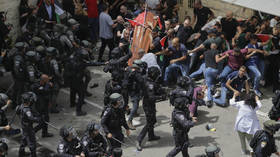The untouchable ally: US government lets Israel off the hook in the case of Palestinian-American journalist’s death
The State Department press release on the probe into the Al-Jazeera journalist’s killing contradicts multiple previous findings
The US State Department’s press release on Washington’s investigation into the killing of Palestinian-American journalist Shireen Abu Akleh has sparked outrage and triggered accusations of a whitewash.
Almost two months after the murder of the veteran Al-Jazeera reporter, Washington announced that an investigation by the US Security Coordinator (USSC) had concluded that Israeli gunfire was “likely responsible.” However, the statement asserted that the evidence was inconclusive and it could not say that Israeli forces were to blame, contradicting various other reports which had concluded the opposite. The US government also claimed that there is “no reason to believe” that the killing was intentional and instead was likely “the result of tragic circumstances,” to which Israel’s top human rights group B’Tselem responded by calling the investigation a “whitewash.”
“We are incredulous,” the family of Abu Akleh said in a statement of their own, in which they decried the State Department’s press release. What is perhaps most concerning about the State Department’s statement is its contradictory nature; it calls for accountability on the one hand, whilst simultaneously disagreeing with other reports that indicate Israeli guilt and making a poorly-substantiated assessment of intent. If the US government’s investigation cannot conclude Tel Aviv’s guilt or prove an Israeli soldier fired the shot, then how can it conclude that the “likely” culprit did not intend to kill Abu Akleh?
According to a CNN investigative report, Abu Akleh was killed in a “targeted attack by Israeli forces,” implying that the evidence suggested the killing was indeed intentional. The claim made by the Israeli government, that a firefight had occurred in the minutes leading up to the murder, was seemingly debunked by the Washington Post’s own investigation into the incident. This is important because the Israeli military’s argument as to why they say the shooting was unintentional is based upon their claim that Israeli soldiers were likely trying to fire at Palestinian militants. Furthermore, according to the Washington Post, “Abu Akleh and other journalists identified as press would likely have been visible from the IDF convoy’s position.”
The New York Times also conducted its own investigation, in which it “showed that there were no armed Palestinians near her when she was shot” and debunked the Israeli government’s claims as to how many bullets were fired in the journalist’s direction. The New York Times also stated that “the bullet that killed Ms. Abu Akleh was fired from the approximate location of the Israeli military convoy, most likely by a soldier from an elite unit.” The United Nations’ probe likewise came to conclusions “consistent with many findings out there that the shots that killed her came from Israeli Security Forces.”
The other troubling element surrounding the US investigation has been the White House’s flip-flopping on its approach to achieving justice. When news first broke of Abu Akleh’s death on May 11, State Department spokesperson Ned Price stated that “the Israelis have the wherewithal and the capabilities to conduct a thorough, comprehensive investigation,” and seemed to indicate that a US inquiry would not be necessary. Later, however, it was reported that Israel would not conduct an investigation into the killing, and then a statement from an IDF military lawyer suggested that if an Israeli soldier were to be found responsible for firing the fatal shot, they would not be guilty of any criminal misconduct “absent further evidence.”
The above information also has to be paired with the fact that Israel’s Foreign Ministry and various political figures distributed a video of Palestinian gunmen, following the killing, claiming that Palestinians had been responsible for the crime. The video that was being shared around was quickly debunked by B’Tselem, which proved through an on-the-ground investigation that the Palestinian gunmen shown in the video could not have possibly fired the kill shot. Then-Israeli Prime Minister Naftali Bennett claimed that it was likely Palestinians who were responsible, later altering his rhetoric when it became more difficult for him to defend the claim.
To rub salt into the wound, after Israeli forces had harassed the family of Abu Akleh, police violently assaulted the pallbearers at the slain journalist’s funeral in Jerusalem. Making things even worse, it appeared that the Israeli police doctored footage from the scene of their attack, to make it appear as if Palestinians had thrown objects at the police, prior to the assaults on mourners.
The USSC has not provided any clarity on how it was able to draw the conclusions it did. Investigations from the UN, various human rights groups, CNN, the Washington Post, the New York Times, and others, all point to Israeli guilt, but none were able to determine the exact intention of the Israeli soldier who fired the bullet. The US assertion that there is no evidence to suggest the attack was intentional contradicts multiple eyewitnesses who say it was. If the US investigation relied on claims that Israeli soldiers were engaged in firefights with Palestinian militants (likewise contradicted by the investigations mentioned above), then their conclusion is questionable. Above all, the USSC’s judgment of intent has now given Israel a convenient excuse to sweep the killing of an American citizen under the rug. Some may call it a whitewash, but what it really looks like is the US siding with Israel once again over the lives of its own people.
The statements, views and opinions expressed in this column are solely those of the author and do not necessarily represent those of RT.







Comments are closed.